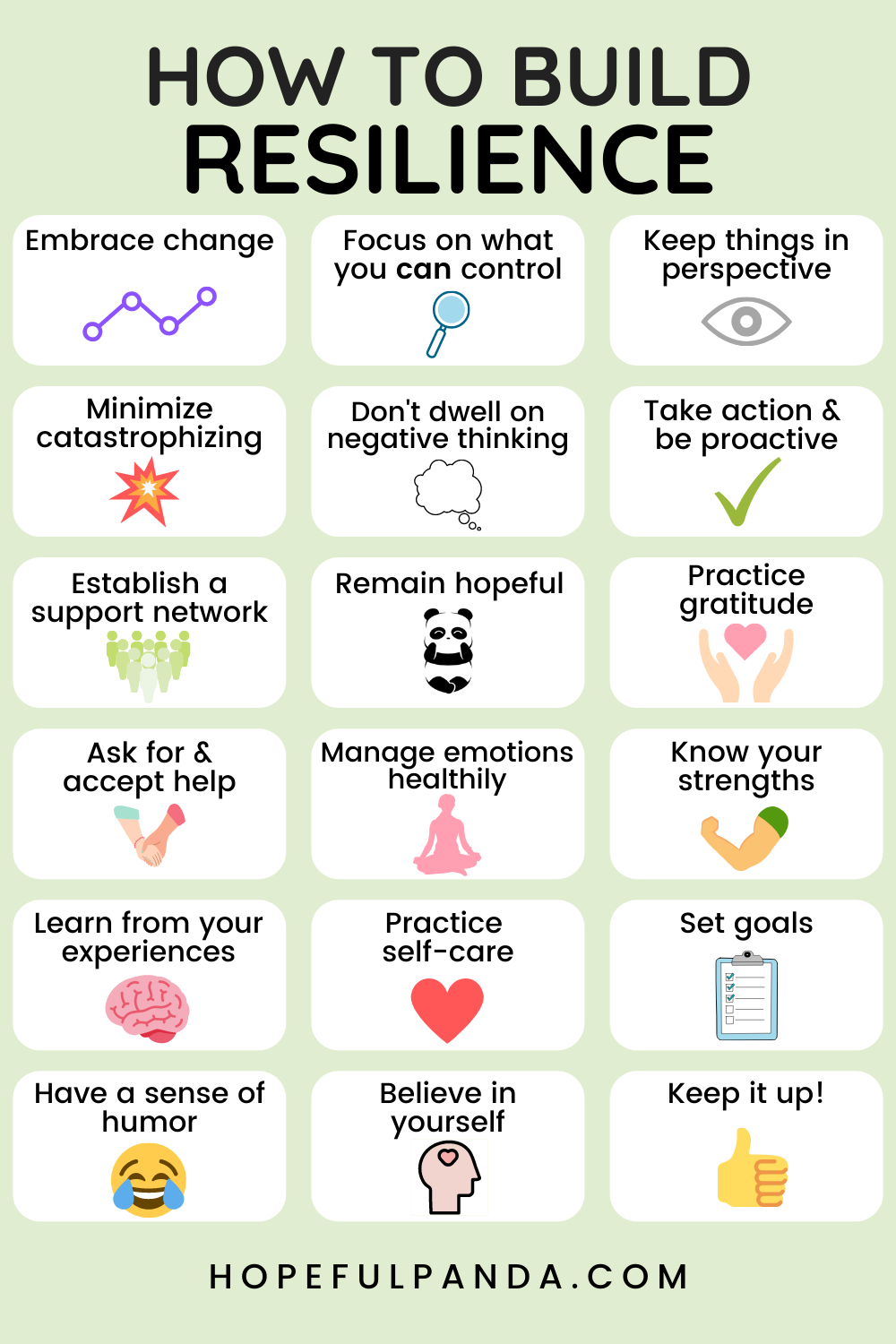Developing Resilience: A Practical Guide To Mental Well-being

Table of Contents
Understanding Resilience and its Benefits
Resilience is the ability to bounce back from adversity, trauma, tragedy, threats, or significant sources of stress—such as family and relationship problems, serious health problems, or workplace and financial stressors. It's not about avoiding hardship, but about adapting to challenges and emerging stronger. Developing strong resilience is paramount for good mental health. It's the cornerstone of navigating life's inevitable difficulties and maintaining a positive outlook.
The benefits of building resilience are numerous and profoundly impact your overall well-being:
- Better stress management: Resilient individuals handle pressure more effectively, preventing stress from overwhelming them. They possess coping mechanisms to navigate stressful situations.
- Improved emotional regulation: Resilience fosters emotional stability, enabling you to manage intense emotions without being consumed by them. This leads to a more balanced emotional life.
- Increased self-esteem: Successfully overcoming challenges boosts self-confidence and self-worth, leading to a stronger sense of self.
- Enhanced problem-solving skills: Resilience encourages proactive problem-solving, enabling you to find creative solutions to difficult situations.
- Stronger relationships: Resilient individuals tend to have healthier and more supportive relationships, as they are better equipped to navigate relationship challenges.
Bullet points outlining further benefits of developing resilience:
- Reduced risk of mental health issues like anxiety and depression.
- Increased adaptability to change and uncertainty.
- Greater ability to cope with trauma and adversity.
- Improved overall life satisfaction and happiness.
Building the Pillars of Resilience: Practical Strategies
Building resilience is an active process. It involves cultivating specific skills and adopting positive habits. Here are key strategies to strengthen your resilience:
Cultivating a Growth Mindset
A growth mindset is crucial for developing resilience. It involves viewing challenges not as insurmountable obstacles, but as opportunities for learning and growth.
- Embrace failures as learning experiences: Instead of dwelling on setbacks, analyze what went wrong, learn from your mistakes, and adjust your approach.
- Focus on effort and progress, not just outcomes: Celebrate your effort and the progress you make, even if you don't achieve your initial goals.
- Challenge negative self-talk and replace it with positive affirmations: Identify and challenge negative thoughts, replacing them with positive and encouraging self-statements.
- Seek out mentors and learn from others' experiences: Learning from others who have overcome similar challenges can provide valuable insights and support.
Developing Strong Social Connections
Strong social support networks are vital for building resilience. Supportive relationships provide a buffer against stress and provide emotional comfort during difficult times.
- Nurture existing relationships and build new ones: Invest time and effort in maintaining close relationships with family and friends.
- Join groups or communities based on shared interests: Connecting with like-minded individuals can foster a sense of belonging and support.
- Seek professional help when needed – therapists, counselors, support groups: Don't hesitate to reach out for professional support if you're struggling to cope.
- Practice active listening and empathy in your interactions: Strong relationships are built on mutual understanding and support.
Prioritizing Self-Care
Self-care is not selfish; it's essential for building resilience. Taking care of your physical and mental health provides the foundation for effectively handling challenges.
- Get enough sleep: Aim for 7-9 hours of quality sleep per night.
- Eat a healthy diet: Nourish your body with nutritious foods that provide energy and support your overall well-being.
- Engage in regular physical activity: Exercise releases endorphins, which have mood-boosting effects.
- Practice mindfulness and meditation: These practices can help you manage stress and improve emotional regulation.
- Engage in hobbies and activities you enjoy: Make time for activities that bring you joy and relaxation.
Mastering Effective Coping Mechanisms
Developing effective coping mechanisms is crucial for managing stress and negative emotions. These techniques help you navigate difficult situations without being overwhelmed.
- Deep breathing exercises: Deep, slow breathing can calm your nervous system and reduce stress.
- Progressive muscle relaxation: This technique involves tensing and releasing different muscle groups to relieve tension.
- Journaling: Writing down your thoughts and feelings can help you process emotions and gain clarity.
- Cognitive Behavioral Therapy (CBT) techniques: CBT techniques can help you identify and challenge negative thought patterns.
- Seeking professional guidance for specific challenges: A therapist or counselor can provide tailored support and guidance for overcoming specific challenges.
Maintaining Resilience Over Time: Long-Term Strategies
Building resilience is an ongoing process, not a destination. It requires consistent effort and self-reflection.
- Regular self-assessment of stress levels and coping mechanisms: Regularly check in with yourself to assess your stress levels and evaluate the effectiveness of your coping strategies.
- Continuous learning and skill development: Continuously learning new skills and expanding your knowledge base can enhance your ability to adapt to new challenges.
- Seeking professional support when facing significant challenges: Don't hesitate to seek professional help when you need it.
- Building a personal resilience plan: Develop a personalized plan outlining your coping strategies and support network.
Conclusion
Developing resilience is a journey that involves understanding your strengths, building supportive relationships, prioritizing self-care, and developing effective coping mechanisms. By actively cultivating a growth mindset, engaging in self-reflection, and consistently practicing these strategies, you can significantly enhance your mental well-being and navigate life's challenges with increased strength and confidence.
Call to Action: Start developing resilience today! Implement the strategies discussed in this guide to build your mental strength and embrace a more fulfilling and resilient life. Don't hesitate to seek professional help if you need support on your journey to building greater resilience.

Featured Posts
-
 Analyzing The Sharp Increase In D Wave Quantum Qbts Stock This Week
May 20, 2025
Analyzing The Sharp Increase In D Wave Quantum Qbts Stock This Week
May 20, 2025 -
 Ftv Lives Hell Of A Run Analyzing Its Influence And Legacy
May 20, 2025
Ftv Lives Hell Of A Run Analyzing Its Influence And Legacy
May 20, 2025 -
 High Stock Market Valuations A Bof A Analysts Rationale For Calm
May 20, 2025
High Stock Market Valuations A Bof A Analysts Rationale For Calm
May 20, 2025 -
 The Fight For Clean Energy Navigating Opposition In A Growing Market
May 20, 2025
The Fight For Clean Energy Navigating Opposition In A Growing Market
May 20, 2025 -
 Amazon Spring 2025 Sale His And Hers Hugo Boss Perfumes Discounted
May 20, 2025
Amazon Spring 2025 Sale His And Hers Hugo Boss Perfumes Discounted
May 20, 2025
Latest Posts
-
 Whats Sydney Sweeney Doing After Echo Valley And The Housemaid New Film Role Revealed
May 21, 2025
Whats Sydney Sweeney Doing After Echo Valley And The Housemaid New Film Role Revealed
May 21, 2025 -
 Sydney Sweeneys Next Role After Echo Valley And The Housemaid
May 21, 2025
Sydney Sweeneys Next Role After Echo Valley And The Housemaid
May 21, 2025 -
 A Hidden Gem The Western Neo Noir Starring Dennis Quaid Meg Ryan And James Caan
May 21, 2025
A Hidden Gem The Western Neo Noir Starring Dennis Quaid Meg Ryan And James Caan
May 21, 2025 -
 Dennis Quaid Meg Ryan And James Caans Forgotten Western Neo Noir
May 21, 2025
Dennis Quaid Meg Ryan And James Caans Forgotten Western Neo Noir
May 21, 2025 -
 Liverpool Dan Liga Inggris 2024 2025 Siapa Pelatih Yang Tepat
May 21, 2025
Liverpool Dan Liga Inggris 2024 2025 Siapa Pelatih Yang Tepat
May 21, 2025
